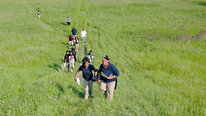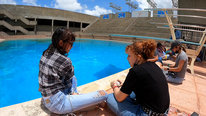SCC-CIVIC-PG Track B: Community-Centric Pre-Disaster Mitigation with Unmanned...
NSF Awards: 2133297
2022 (see original presentation & discussion)
Grades 9-12
This project will review progress in the first year of a Civic Innovation grant where approximately 60 students are expected to work in some form with five emergency management agencies, five universities including CMU and UC Berkeley, three companies, and two non-profits. The students, taken from the schools where 76% are economically disadvantaged, 23% African-American, and 57% Hispanic, will be trained to collect or process pre-disaster mitigation data. These activities will amplify their STEM and career certificate courses, robotics clubs, and incubator experiences. The data and data products will be immediately available to state and local pre-disaster mitigation agencies to prevent floods, wildfires, and hurricane damage. Data in the first year can result in savings on the order of $21K per parcel by informing common planning decisions, such as protecting open space and buying out vulnerable housing.
Related Content for STEM Pre-Disaster Mitigation by Vulnerable Communities
-
 2018Minority SURGE Capacity in Disasters
2018Minority SURGE Capacity in Disasters
DeeDee Bennett
-
 2022Urban Environmental Stewards: Youth Aid Community with STEM
2022Urban Environmental Stewards: Youth Aid Community with STEM
Connie Flanagan
-
 2016In the Neighborhood with Geospatial Technology
2016In the Neighborhood with Geospatial Technology
Beth Schlemper
-
 2016Using Data Visualizations to Empower Informal STEM Educators
2016Using Data Visualizations to Empower Informal STEM Educators
Caitlin K. Martin
-
 2022STEAM for social impact: A immersion experience for students
2022STEAM for social impact: A immersion experience for students
Aaron Cortes
-
 2019Broadening Identities for Diverse Groups Engaging with STEM
2019Broadening Identities for Diverse Groups Engaging with STEM
Heidi Carlone
-
 2022Science Education in the New Normal: Role of Citizen Science
2022Science Education in the New Normal: Role of Citizen Science
Russanne Low
-
 2019Minority SURGE Capacity in Disasters (SURGE)
2019Minority SURGE Capacity in Disasters (SURGE)
DeeDee Bennett

Billy Spitzer
Executive Director
Robin,
Thank you for sharing information about this project. It sounds like you are in the early stages of getting underway. It sounds like there is potentially a lot of complexity involved, and I was curious to learn more about what kinds of challenges you are encountering, and how both the high school students and emergency management professionals are making meaning from the data they are collecting.
It's great to hear that you are paying students for their time. I was wondering to what extent students see this work as a learning opportunity, a job, or both?
Thanks,
Billy
Robin Murphy
Raytheon Professor
Why thank you!
The students are seeing this as a learning opportunity as it is either part of their class (Bryan schools) or as an extracurricular learning opportunity for college career military readiness certificates (Galveston schools).
Extracting meaning is easy- we're getting a lot of "oh, look at that" from the emergency managers even before populating the GIS systems. Internships will be doing the GIS analysis this summer.
Beatriz Canas
Director of equity, diversity, inclusion and accessibility
Robin,
Thank you for sharing information about your project. What types of specific skills do you hope student participants will gain?
Robin Murphy
Raytheon Professor
The students get specific CCMR (College, Career, Military Ready) skills in drones (Part 107 license) and GIS which earn them a certificate(s) from the State of Texas.
We also expect them to get skills working with experts and adults (emergency managers).
Thanks!
Nonye Alozie
Hi Robin, this is great. I love seeing projects that directly relate to the students' lives and communities. I would be interested in knowing: 1) How you involve stakeholders to do this work, 2) How students respond/like doing this work, and 3) what students learn from this work.
Corinne Brenner
What in interesting project! Is there a commitment on the part of state and local pre-disaster mitigation agencies to implement the findings in specific ways?
Further posting is closed as the event has ended.